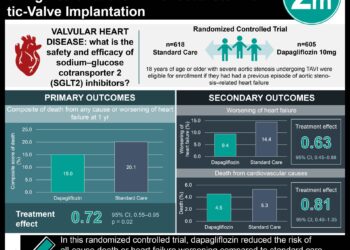Dapagliflozin efficacious and safe in treating heart failure
1. Dapagliflozin reduced the risk of worsening heart failure or cardiovascular death regardless of frailty status.
2. Dapagliflozin improved quality of life and physical function regardless of frailty status.
Evidence Rating Level: 1 (Excellent)
Study Rundown: Frailty is defined as increased vulnerability to endogenous and exogenous stressors due to loss of homeostatic reserves across several physiologic systems, leading to poor health outcomes. In relation to heart failure, patients with heart failure (HF) are up to 6 times more likely to be frail than the general population, and frail persons may be at a higher risk for developing HF. Frail patients with HF also have a higher risk for death, hospitalizations, and functional decline than non-frail patients with HF. However, there is a gap in knowledge as to whether new HF treatments are effective and safe in frail patients, as frail patients may have reduced tolerance to treatments, experience more adverse drug reactions, have poorer adherence, and be more likely to discontinue treatment than non-frail patients. This study demonstrated the efficacy and safety of dapagliflozin in patients with heart failure with reduced ejection fraction, regardless of frailty status. This study was limited by enrollment criteria that precluded the inclusion of very high-risk patients. Nevertheless, these study’s findings are significant, as they demonstrate that regardless of frailty status, dapagliflozin significantly improved all outcomes examined in patients with heart failure, such as the risk of worsening heart failure or cardiovascular death.
Click to read the study in AIM
Relevant Reading: Long-Term Efficacy of Dapagliflozin in Patients With Type 2 Diabetes Mellitus Receiving High Doses of Insulin
In-Depth [randomized clinical trial]: This post hoc analysis of phase 3 randomized clinical trial examined 4742 patients from a randomized, double-blind, placebo-controlled trial in patients with heart failure with reduced ejection fraction (HFrEF). Patients with a diagnosis of HF for at least 2 months, a left ventricular ejection fraction (LVEF) of 40% or less, and an N-terminal pro-B-type natriuretic peptide concentration of 600 pg/mL or more if hospitalized for HF within the previous 12 months were eligible for the study. Patients who had symptomatic hypotension, systolic blood pressure lower than 95 mm Hg, acute decompensated HF, or hospitalization due to decompensated HF fewer than 4 weeks before enrollment were excluded from the study. The primary outcome measure was the composite of worsening HF (HF hospitalization or an urgent visit for worsening HF and administration of intravenous therapy) or cardiovascular death. Outcomes in the primary analysis were assessed via the Kaplan-Meier estimator, the Aalen-Johansen estimator, and Cox proportional hazards models. Based on the analysis, dapagliflozin reduced the risk for worsening HF or cardiovascular death across all frailty status classes: the hazard ratios from lowest to highest class were 0.72 (95% Confidence Interval [CI], 0.59 to 0.89), 0.77 (95% CI, 0.62 to 0.97), and 0.71 (95% CI, 0.54 to 0.93). The number of patients who needed to treat to prevent 1 primary event per 100 person-years was 31, 25, and 15 in the lowest to highest frailty class, respectively. Dapagliflozin also significantly improved symptoms, physical function, and quality of life, regardless of frailty class. The absolute reductions in clinical events and improvements in health status were also generally larger in the frailest patients. Overall, this study demonstrates that dapagliflozin reduced the risk for worsening HF events, cardiovascular death, and all-cause death, and improved symptoms, physical function, and quality of life, regardless of the level of frailty in patients with HFrEF, also leading to larger absolute reductions in clinical events in more frail patients.
Image: PD
©2022 2 Minute Medicine, Inc. All rights reserved. No works may be reproduced without expressed written consent from 2 Minute Medicine, Inc. Inquire about licensing here. No article should be construed as medical advice and is not intended as such by the authors or by 2 Minute Medicine, Inc.







